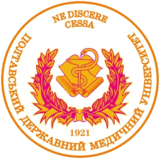Будь ласка, використовуйте цей ідентифікатор, щоб цитувати або посилатися на цей матеріал:
http://repository.pdmu.edu.ua/handle/123456789/2366| Назва: | Зв’язок комплаєнсу з індивідуальними особливостями хворих |
| Інші назви: | Связь комплаенса с индивидуальными особенностями больных Compliance Connection with the individual characteristics of patients |
| Автори: | Трибрат, Тетяна Анатоліївна Шуть, Світлана Володимирівна Шепітько, Валентина Володимирівна Трибрат, Татьяна Анатольевна Шуть, Светлана Владимировна Шепитько, Валентина Владимировна Trybrat, T. Shut, S. Shepitko, V. |
| Дата публікації: | 2017 |
| Видавець: | Вищий державний навчальний заклад України «Українська медична стоматологічна академія» |
| Бібліографічний опис: | Трибрат Т. А. Звязок комплаєнсу з індивідуальними особливостями хворих / Т. А. Трибрат, С. В. Шуть, В. В. Шепітько // Вісник проблем біології і медицини. – Полтава. – 2017. – Вип. 4, Т. 1 (139). – С. 275–277. |
| Короткий огляд (реферат): | У терапевтичних хворих рівень комплаєнсу асоціюється зі статтю, віком та ураженою системою органів та не залежить від рівня здобутої освіти. Для підвищення комплаєнсу лікареві доцільно надавати значно більше уваги психоемоційному стану хворого, його довірі до тактики лікаря, поясненню можливих наслідків часткової або повної відмови від лікувального плану. Саме тому перспективним напрямом є розробка й впровадження спеціальних програм з урахуванням індивідуальних особливостей пацієнта; У терапевтических больных уровень комплаенса ассоциируется с полом, возрастом и пораженной системой органов и не зависит от уровня полученного образования. Для повышения комплаенса врачу целесообразно предоставлять значительно больше внимания психоэмоциональному состоянию больного, его доверии к тактике врача, объяснению возможных последствий частичного или полного отказа от лечебного плана. Именно поэтому перспективным направлением является разработка и внедрение специальных программ с учетом индивидуальных особенностей пациента; The effectiveness of pharmacotherapy for internal diseases relies very often not only on the proper drug prescription, drugs` dosage, form and quality, but also on the proper execution of doctor`s recommendation by the patient and his desire to cooperate with his family doctor. Exactly for this in medicine there is a term of compliance (English compromise - consent, tolerance) – the patient`s voluntary compliance with the prescribed treatment regimen. According to the WHO, about 50% of patients do not follow the the doctor`s recommendations. The purpose of this article is to determine the influence of additional factors, namely gender, age, level of education of the patient, his marital status and group of disease on compliance. Using the data obtained during the patient survey, four compliance dependence systems were created: compliance/age, compliance/gender, compliance/education level, compliance/infected body system. According to the calculation results of the average values of the compliance for each age category and gender, a certain set of regularities has been identified. First, men of all ages demonstrated a much higher number of compliance units than women that indicates their lower liability to be treated. This fact can be explained by moral and psychological characteristics of upbringing of the men. The next regularity was the connection between the compliance and the patient`s age. Among young people (18-25 years), the compliance with treatment is close to high because most of the patients in this group live with their family, who care about the implementation of medical advice. Next in values test we can see sharp rise upward that indicates a less careful compliance of this age group with treatment. In the age group of 40-55 we can see again a near-to-high result, which can be related to the fact that at this age many people have the first signs of a chronic disease (hypertensive crises, hypo-or hyperglycemic coma, microinsulte, etc.). Man at this age does not want to approach to the status of "elderly" and therefore cares more about his health. Further, as aging, the compliance with treatment becomes lower due to a number of factors, such as: old-fashioned forgetfulness, financial difficulties, critical attitude towards the prescribed medicine, developing resistance to a particular medicine, etc. Based on the data obtained during the survey, the regularities between the level of education and compliance have not been found. The results of the study show that among all therapeutic patients the highest compliance with treatment was observed among the patients with such chronic diseases as cardiovascular, respiratory systems and intestinal tract, which can be related to the relative ease of drugs use (compared with endocrine diseases treatment) and the degree of clinical signs of the disease. Conclusions. Among therapeutic patients the level of compliance is associated with the sex, age and the infected organ system of organs and does not depend on the level of education received. To increase the compliance with the doctor it is reasonable to pay much more attention to the psycho-emotional state of the patient, his confidence and trust in the doctor`s tactician, the explanation of the possible consequences of a partial or complete refusal to follow the treatment plan. That is why the promising direction well as the development and implementation of special therapeutic programs, taking into account the individual characteristics of the patient. |
| Ключові слова: | комплаєнс вік стать рівень освіти комплаенс возраст пол уровень образования compliance age gender level of education |
| URI: | http://repository.pdmu.edu.ua/handle/123456789/2366 |
| Розташовується у зібраннях: | Наукові праці. Кафедра пропедевтики внутрішньої медицини Вісник проблем біології і медицини, Випуск 4, Том 1 (139) |
Файли цього матеріалу:
| Файл | Опис | Розмір | Формат | |
|---|---|---|---|---|
| Zvyazok_komplaency_z_induvidyalnumu_osobluvostyzmu_hvoruh.pdf | 452,63 kB | Adobe PDF | Переглянути/Відкрити |
Усі матеріали в архіві електронних ресурсів захищені авторським правом, всі права збережені.



